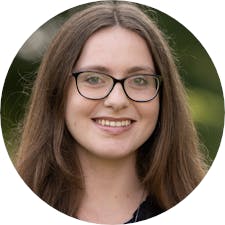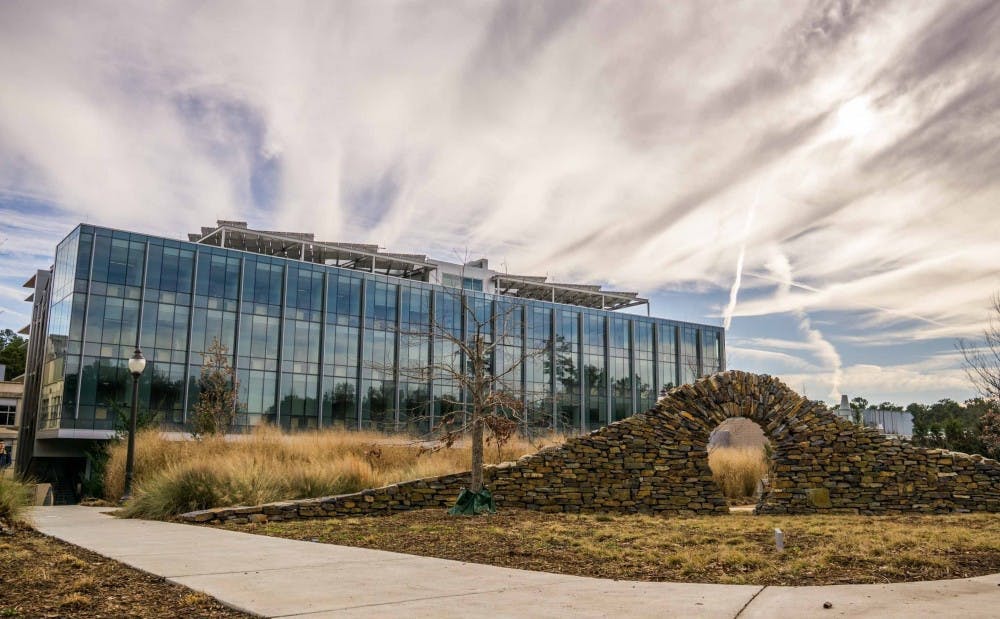The Office of Climate and Sustainability hosted a seminar Tuesday evening to explore questions of equity related to a just energy transition, bringing in guest speakers from across the financial sector to shed light on how to effectively prioritize social and environmental goals in investment decisions.
Community stakeholders met in the Rubenstein Library’s Holsti-Anderson Family Assembly Room for the conversation, which is the fifth installment in the Investing for Mission-Driven Institutions seminar series.
The series, which began last fall, was organized in the context of an ongoing debate on campus about Duke’s investment practices. Student groups have mobilized on campus for over a decade to call on the Duke University Management Company (DUMAC) to divest from fossil fuel industries, submitting formal reports and organizing protests on campus to bring attention to the issue.
Duke Climate Coalition, which has led the effort in recent years, organized a referendum through the Duke Student Government in March 2022 to gauge the student body’s stance on the issue. Out of the 2,757 students who voted in the referendum, 2,456 were in favor of divestment — almost 90%.
Before Tuesday’s session began, Toddi Steelman, vice president and vice provost for climate and sustainability, noted that the Advisory Committee for Investment Responsibility released a report Feb. 16 recommending that DUMAC refrain from divesting the University endowment from fossil fuels.
“While ACIR’s members individually recognize the impact of fossil fuels on climate change, from an academic perspective we do not find compelling evidence that DUMAC divesting from fossil fuel companies would achieve the desired outcome,” the report reads.
Steelman expressed her desire that the series’ regular attendees convene at a later date to review the report and discuss opportunities for further action.
The seminar’s panelists weighed in on the issue of divestment at Duke, agreeing that the University has a responsibility to act as a global leader in responsible investing practices and that financial targets would likely not be inhibited by also factoring in ethical considerations.
“I’m not a registered investment advisor, but what I would say is that it is definitely possible to drive positive social and environmental returns and to be aligned with your mission or your goals or your values as an institution and also meet all of the needs for longevity and even perpetuity,” said Pedro Henriques da Silva, director of the Shifting Trillions initiative at the Sierra Club Foundation (SCF).
Lindsay Androski, president and chief executive officer of Roivant Social Ventures, agreed with da Silva, arguing that educational institutions are some of the best-positioned organizations to act as case studies in mission-driven investment ventures.
“I would advise the endowment … to try to take a leading role in helping to redefine how these types of investments are looked at and at least starting with a meaningful percentage of the endowment being invested in a way that is measuring social impact as well as financial impact,” Androski said. “The upside potential is really really huge.”
Androski and da Silva were joined on Zoom by fellow guest speaker Cathi Kim, director of credit union network Inclusiv. The session was moderated by senior Emily Nagamoto, president of the Undergraduate Environmental Union, and Ronnie Chatterji, Mark Burgess and Lisa Benson-Burgess distinguished professor of business and public policy, and centered mainly on equity considerations surrounding the energy transition.
Nagamoto prompted the participants to begin by defining a “just transition.”
“It’s starting with the fact that one, we’re all impacted by climate events and climate change,” Kim said. “But for us, a just transition means that everyone has the opportunity to have a future in which they can be safe from all these climate events and … [can] contribute to a regenerative future.”
For Kim, a regenerative future is one where communities are thriving, safe and healthy and where individuals have access to the resources needed to provide for community wellness. However, she noted that low-income communities are often the most impacted by climate events, making them doubly vulnerable to new threats.
“How do we mobilize capital so that it goes into the hands of communities that are most impacted by climate events and that communities also have a voice in the development of sustainable solutions?” Kim asked, identifying a guiding question for the evening.
Da Silva agreed, emphasizing the importance of strategically directing capital resources toward endeavors that promote social goals.
“Capital is not just money. It’s financial, but it’s also the relational and intellectual resources that make things move, and what’s done with capital affects everything. It affects our economy, our society and the reality in which we all live,” da Silva said.
Da Silva shared that his work with the SCF attempts to answer this question with a three-pronged approach that centers environmental justice. This strategy entails treating climate as a human rights issue, treating justice as a climate solution, and addressing and mitigating the risks associated with the energy transition itself.
He also introduced audience members to the idea of a catalytic capital portfolio: investments that are made with the ultimate goal of creating a social or environmental impact, not generating significant financial returns.
“What carving out this specific portfolio in essence allows us to do is … to set aside this pool of money to make these specific types of investments that banks wouldn’t touch, that other institutional investors might not touch, that is certainly not right for the federal government, and that then allows these businesses to get the venture capital that they need,” da Silva said.
Kim explained a similar tactic that her firm employs with their investors: social impact CDs. Inclusiv uses these certificates of deposit to provide low-cost liquidity to small businesses and individual households in immediate need. The firm employed this strategy in Puerto Rico in 2017 to stimulate recovery efforts in the aftermath of Hurricane Maria.
“Some of the things that we’re looking at and learning from what happened in Puerto Rico is really, how do we equip and provide equitable access to resources to frontline communities and to community-led institutions to help their communities become more resilient,” Kim said.
Audience member and master’s of public policy candidate Ian Hitchcock emphasized the importance of uplifting the voices of these frontline communities when making decisions about capital investment in the context of climate resiliency.
“Nothing will be perfectly clean. There will always be burdens, and we have to be honest and open about that,” Hitchcock said. “But … maybe improving access to who gets access to decision-making can help improve outcomes.”
Ultimately, speakers agreed that incorporating social and environmental targets into investment practices makes sense not only from an ethical standpoint but also a financial one in a world with a changing climate and rapidly evolving industries as a result.
“If you weren’t factoring that into your risk management approach, that’s billions and billions — literally — of dollars lost, and that’s the predicament that a lot of large financial institutions find themselves in today,” da Silva said. “It’s really this fundamental premise that all value in our society and in our economy is dependent on healthy people and a healthy planet.”
Get The Chronicle straight to your inbox
Signup for our weekly newsletter. Cancel at any time.

Zoe Kolenovsky is a Trinity sophomore and news editor of The Chronicle's 120th volume.

